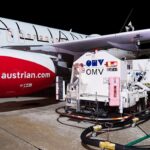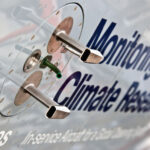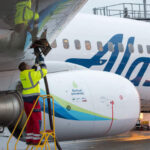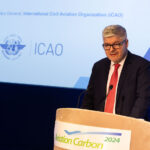Leading aircraft leasing companies are becoming increasingly vocal about their commitment to sustainable aviation, as evidenced in recent reports and thought-leadership papers from Aircraft Leasing Ireland (ALI), the body representing 31 of the world’s largest lessors, and major lessors Avolon and SMBC. It is hardly a surprise that businesses with large corporate shareholders take ESG seriously as it is an industry that has a 25-year investment horizon raising and deploying billions of dollars in capital globally every year to finance hundreds of jetliners and turboprops, writes Mark Pilling. The drive to aviation operations with net zero emissions has a fundamental impact on the demand and types of aircraft acquired and placed by lessors and thus the risk and reward considerations of the air finance world. These initiatives are expected to be followed by all major players in the air finance industry as they fashion and declare their sustainability and ESG strategies.
ALI launched its ESG narrative, ‘Aviation Sustainability: Our Future’ at a recent Airline Economics conference in Dublin. Declan Kelly, Chair of ALI, said: “Air travel has been a catalyst for our global economy. With the industry set to achieve a steady growth rate over the coming years, it is essential that this is delivered sustainably. Today we are taking our first, unified, positive steps as lessors to show our commitment to supporting the wider industry to achieve net zero carbon emissions by 2050.” ALI is a relatively new body formed by Ibec, Ireland’s lobby and business representative group. The report outlines tangible steps to be taken by aircraft lessors to support aviation to reach the net zero goal.
“This is achievable, but it requires a seismic shift in the development of new technologies in the area of carbon sequestration, sustainable aviation fuels (SAF) and new propulsion aircraft,” said Kelly. “Support is therefore required at all levels across government and industry. Ireland, as an island aviation nation, can play a leading role in this technological research and leasing can underpin this by deploying our capital and buying power.”
Authored in conjunction with Oliver Wyman, the University of Limerick and TU Delft Netherlands, the narrative outlines aviation’s pathways to achieve net zero through aircraft design, operational improvements, SAF, electrical/hydrogen propulsion and recycling. Jan Melgaard, Executive Chair of FPG Amentum and Chair of ALI’s Sustainability Committee said: “The complexities of aviation, driven by an extensive regulatory environment, result in the technological leaps required to address the climate threat being measured in decades rather than years. As a result, the need for us to take action today to transition our industry to carbon neutrality by 2050 is even more outspoken, even though the results of our actions are not immediately visible.”
ALI pledges to be the leading aircraft lessor organisation on sustainability and driving the commitment across the entire aircraft lifecycle. Objectives include the development of a charter during 2022 that would demonstrate leadership in carbon disclosures and accelerate progress in future aircraft and low-carbon technologies. As buyers of more than 50% of the world’s new technology aircraft, ALI is encouraging its members “to use their very significant influence with aerospace manufacturers and airlines” and require a step change to ensure the industry can achieve net zero by mid-century.
To encourage members to act on the environment today, it recommends their employees choose travel service providers based on their sustainability credentials, steer aircraft investments towards aircraft with low energy intensity, increase the recycling of aircraft and expand members’ value chain to include sustainable investments in, for example, SAF or electric/hydrogen-based propulsion projects.
ALI also intends working with the University of Limerick in respect of leadership of sustainability initiatives and broaden involvement with other Irish universities in a collaborative effort to drive sustainability via research, curriculum development and continued development of thought leadership. Another commitment is to hold a first Aviation Sustainability Day in Ireland this year, inviting participation from relevant stakeholders for discussion on progressing the sector towards net zero by 2050.
Robbie Bourke, Partner, Oliver Wyman and co-author of the narrative added: “The aircraft leasing community is taking its first practical steps to support and work with the entire industry to achieve net zero. This will be delivered through close collaboration with OEMs, airlines and governments, who have within their gift the power to accelerate change.”
Meanwhile, Avolon, one of the world’s largest lessors (and a member of ALI), issued its annual outlook paper for 2022 titled ‘Rise Above’. Co-authored by Jim Morrison, Head of Portfolio Management, and Rosemarie O’Leary, Head of Counterparty Risk, at Avolon, the paper reviews the key trends in the aviation industry for airlines, manufacturers and lessors, identifying themes that will shape the year ahead. Of its seven forecasts for 2022, three – covering eVTOLs, SAF and carbon credit prices – had sustainability at their core.
It notes a “handful” of electric vertical take-off and landing (eVTOL) prototypes flew in 2021 and Avolon predicts full-scale prototypes of 10 all-electric aircraft will fly this year. Disruptive technologies start small “before growing to attack incumbents’ fortresses,” it says, “and watch out for expanding customer bases as the technology is proven and performance is enhanced.” Avolon itself ordered up to 500 electric aircraft in June 2021, becoming a launch customer of Vertical’s VA-X4 eVTOL machine.
Although supply is limited, demand for SAF is strong and Avolon projects a quadrupling of SAF production by 2030 as projects are funded in 2022. Policies must be structured to ensure the economics stack up against other renewable fuels, it says, whilst believing blending mandates and production incentives will ensure long-term demand and so enabling airlines to sign up for offtake agreements. “With revenues secured, so projects will be financed and construction started, leading to SAF production capacity growing exponentially,” says the paper.
Avolon sees the price of carbon credits doubling again in 2022, with the global voluntary offset market potentially worth $50 billion by the end of the decade, up from $300 million in 2018. The Taskforce on Scaling Voluntary Carbon Markets is enabling this growth by crafting market standards to create certainty over the value of carbon credits and liquidity that creates price transparency, it says, and believes the price of mandated EU carbon permits will continue to rise as demand increases from the reopening of economies while supply is squeezed.
In December, lessor SMBC Aviation Capital, another member of ALI, launched its inaugural ESG strategy which outlines the long-term objectives of the business to 2050. It commits to setting science-based targets and disclose in line with best practice reporting under the Task Force on Climate-related Financial Disclosures (TCFD), as well as aligning all its initiatives with the UN Sustainable Development Goals (SDGs). It has a current fleet of over 730 owned, managed and committed aircraft, of which 61% are latest technology and most fuel-efficient types. SMBC is targeting raising this proportion to 80% by the end of fiscal 2024 and intends to be one of the first to invest in electric and/or hydrogen powered commercial passenger aircraft, which are expected in the next 15 years.
“We will work with our customers on their decarbonisation journeys,” promises the company in its ESG strategy report. “We are providers of finance and can develop creative ways to help the industry to progress to SAF and zero emissions aircraft.”
SMBC adds it will maintain and enhance its “best-in-class” corporate governance, embed ESG into its corporate governance framework and introduce metrics to encourage strong performance in ESG across the organisation.
“Aircraft leasing will have an increasingly influential role in the future of the industry,” comments Peter Barrett, Chief Executive of SMBC in the report. “We must lead by example on all aspects of ESG and in particular on the critical issue of the environment. The transition to a more sustainable aviation industry is going to move at a rate far in excess of anything seen before. Leadership will be a source of competitive advantage and we are committing resources to ensure that this is embedded into our business and core product offering.”
Photo: Aircraft leasing company Avolon and Japan Airlines announced in October 2021 a partnership to commercialise zero-emissions eVTOL aircraft in Japan
















More News & Features
EASA releases status report on Europe’s SAF production and readiness to meet blending targets
New study highlights differing strategies and barriers to decarbonising aviation in UK and Europe
SITA teams with Arab airlines on developing technology to enhance flight sustainability
Airbus enters partnerships with airlines Wizz and EVA to help prepare for SAF introduction
European aviation players launch Project SkyPower to drive investment in e-SAF and meet EU and UK mandates
Loganair and Heart partner on UK electric flight, while magniX and NASA unveil US e-test aircraft